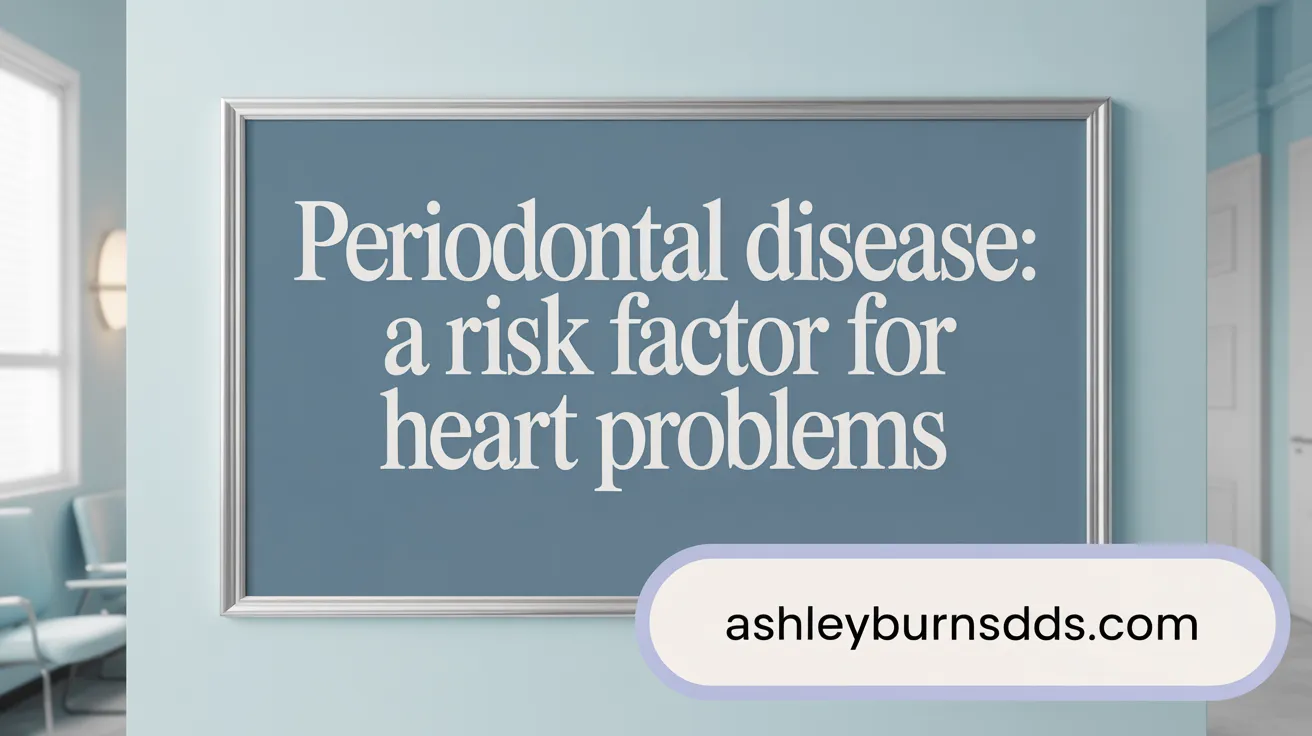Understanding the Interplay Between Oral and Heart Health
Emerging scientific evidence increasingly highlights a significant association between oral health, particularly gum disease, and cardiovascular conditions such as heart disease and stroke. This narrative explores the underlying biological mechanisms, role of oral bacteria, epidemiological findings, and preventive strategies linking oral health status to heart disease risk, offering a comprehensive overview for readers seeking the science behind this crucial health connection.
Scientific Evidence Linking Oral Health and Cardiovascular Disease

What is the scientific connection between oral health and heart disease?
Research suggests that poor oral health, particularly gum disease and heart disease connection, is linked to a higher risk of cardiovascular problems. Infections and inflammation in the mouth can influence systemic health by promoting inflammation in blood vessels and allowing oral bacteria to enter the bloodstream. This systemic response can contribute to the formation of arterial plaques and increase the likelihood of heart attacks and strokes.
What do epidemiological and mechanistic studies reveal about the correlation between oral health and heart disease?
Epidemiological studies consistently show a correlation between poor oral health, such as periodontal disease and cardiovascular disease link, and increased rates of heart disease. For example, individuals with gum disease are about 28% more likely to experience a heart attack and three times more likely to have a stroke compared to those with healthy gums. Mechanistic research supports these findings by identifying potential pathways, such as bacteria entering the bloodstream, causing inflammation, and contributing to atherosclerosis and gum disease.
However, it is important to interpret these studies with caution. Many confounding factors, especially smoking influence on oral and heart health, influence the observed associations. In a large 2018 study of nearly a million people, the link between tooth loss and coronary heart disease largely disappeared after adjusting for smoking status, indicating that lifestyle factors may partly explain the connection (2018 tooth loss and heart disease study).
Limitations and confounding factors such as smoking
While the evidence points to an association, direct causality between poor oral health and heart disease has not been definitively established. Factors like smoking, genetics, healthcare access, and lifestyle choices can confound the relationship (oral health and cardiovascular risk).
In conclusion, maintaining good oral health through regular dental care, avoiding smoking, and adopting healthy lifestyle habits may reduce the risk of cardiovascular disease, but further research is needed to clarify the causal links (preventing heart disease through dental care.
Periodontal Disease and Increased Cardiovascular Risk

How does periodontal disease influence cardiovascular risk?
Periodontal disease is a chronic inflammatory condition affecting the gums and supporting structures of the teeth. It is primarily caused by bacterial infection and ongoing inflammation in the oral cavity.
This persistent gum inflammation can lead to the bacteria and inflammatory substances entering the bloodstream through damaged gum tissues. Once in circulation, these bacteria and inflammatory mediators can promote systemic inflammation, which is a key factor in the development of atherosclerosis — the buildup of fatty plaques within the arteries (gum disease and heart disease connection.
Research shows that individuals with periodontal disease have a higher likelihood of developing cardiovascular problems, including coronary artery disease (oral health impact on cardiovascular health. The inflammation caused by these oral infections can accelerate arterial plaque formation and make existing plaques more unstable, increasing the risk of heart attacks and strokes (gum disease and heart disease connection, relationship between oral health and heart disease).
Certain bacteria, such as Porphyromonas gingivalis, are specifically implicated in this process. These pathogens can invade blood vessel walls, trigger immune responses, and contribute to vascular damage (Porphyromonas gingivalis and rheumatoid arthritis, gum disease and heart health).
Maintaining good oral hygiene, seeking regular dental care, and controlling periodontal infection are important strategies to potentially reduce systemic inflammation and lower the risk of cardiovascular events, highlighting the close link between oral and heart health (importance of good oral health, preventing heart disease through dental care, oral hygiene and heart health connection).
Oral Bacteria and the Microbiome’s Role in Heart Health
 The oral microbiome comprises over 700 bacterial species, some of which, such as Fusobacterium nucleatum and Porphyromonas gingivalis, are associated with gum disease and heart disease connection and have been implicated in cardiovascular health issues. These bacteria can become pathogenic when oral hygiene is poor, leading to gum inflammation and periodontal infections.
The oral microbiome comprises over 700 bacterial species, some of which, such as Fusobacterium nucleatum and Porphyromonas gingivalis, are associated with gum disease and heart disease connection and have been implicated in cardiovascular health issues. These bacteria can become pathogenic when oral hygiene is poor, leading to gum inflammation and periodontal infections.
One of the critical concerns is how these bacteria can translocate from the mouth into the bloodstream. Usually, the gums act as a barrier, but inflamed or bleeding gums—as seen in periodontal disease—allow bacteria to enter systemic circulation. Once in the bloodstream, these microbes can travel to various organs, including the heart (Oral bacteria and heart disease risk).
Research has found oral bacterial DNA, including from Fusobacterium nucleatum, in cardiovascular tissues such as arterial plaques and thrombi. These findings suggest that bacteria from the mouth are not merely bystanders but may actively participate in plaque formation and stability, possibly accelerating atherosclerosis (Oral bacteria in non-oral sites).
The mechanisms behind the influence of oral bacteria on heart health include systemic inflammation triggered by bacterial presence. Bacteria like P. gingivalis can activate immune responses, leading to endothelial dysfunction—an early step in blood vessel disease—and promoting the buildup of fatty deposits in arteries. This ongoing inflammation increases the risk of heart attacks and strokes (Oral health and heart disease connection.
In conclusion, emerging evidence indicates that oral microbes, especially pathogenic species, affect cardiovascular health by promoting inflammation and contributing to plaque development within arteries. Continued research into the oral microbiome's influence and interventional strategies targeting oral bacteria could play a crucial role in reducing cardiovascular disease risk (Oral Microbiome and Cardiometabolic Conditions).
Risks of Poor Oral Hygiene and the Inflammatory Cascade
 Maintaining good oral hygiene is crucial for overall health, particularly for heart health. When oral hygiene is neglected, it can lead to gum disease, also known as periodontal disease. This condition involves bacterial infection and chronic inflammation of the gum tissues, which, if untreated, can cause bleeding, swelling, and even tooth loss.
Maintaining good oral hygiene is crucial for overall health, particularly for heart health. When oral hygiene is neglected, it can lead to gum disease, also known as periodontal disease. This condition involves bacterial infection and chronic inflammation of the gum tissues, which, if untreated, can cause bleeding, swelling, and even tooth loss.
The bacteria involved in gum disease can enter the bloodstream through inflamed or damaged gum tissue. Once in circulation, these harmful bacteria and their toxins can trigger systemic inflammatory responses. This widespread inflammation is a significant concern because it contributes to the development of cardiovascular problems. Several studies have linked the presence of oral bacteria to increased risk of atherosclerosis—a condition where plaque builds up in arteries—and to heart attacks and strokes.
Chronic oral inflammation elevates the levels of inflammatory markers such as C-reactive protein (CRP) throughout the body. These markers indicate ongoing inflammation and are associated with the progression of cardiovascular diseases. Inflammation can cause damage to the endothelial lining of blood vessels, impairing their function, leading to endothelial dysfunction—a precursor to artery narrowing and hardening.
Individuals with gum disease are two to three times more likely to suffer severe cardiovascular events like heart attacks and strokes. Bacteria from infected gums can also contribute to the formation of arterial plaques and may make existing plaques more unstable, increasing the risk of clots that can block blood flow.
To mitigate these risks, experts recommend maintaining rigorous oral hygiene practices, including brushing at least twice daily, flossing regularly, and scheduling routine dental checkups. These habits help reduce bacterial growth and prevent gum disease, thereby lowering systemic inflammation and supporting cardiovascular health. Additionally, lifestyle modifications such as quitting smoking and adopting a balanced diet can further improve oral and heart health.
In summary, poor oral hygiene fosters bacterial growth and inflammation that can have far-reaching effects on systemic health, especially increasing the risk of cardiovascular conditions. Addressing oral health proactively is a vital step toward protecting the heart and maintaining overall well-being.
Preventative Measures to Safeguard Oral and Heart Health
 Maintaining good oral health is essential not only for a healthy smile but also for cardiovascular wellbeing. Regular dental checkups play a crucial role in early detection and management of gum disease, which has been linked to increased risks of heart attack and stroke. Brushing teeth at least twice daily for two minutes with fluoride toothpaste, along with daily flossing, helps remove plaque and bacteria that can cause gum inflammation (Good oral hygiene practices, Brushing and flossing benefits).
Maintaining good oral health is essential not only for a healthy smile but also for cardiovascular wellbeing. Regular dental checkups play a crucial role in early detection and management of gum disease, which has been linked to increased risks of heart attack and stroke. Brushing teeth at least twice daily for two minutes with fluoride toothpaste, along with daily flossing, helps remove plaque and bacteria that can cause gum inflammation (Good oral hygiene practices, Brushing and flossing benefits).
Behavioral modifications are also impactful. Avoiding tobacco products is strongly recommended, as smoking can exacerbate gum disease and confound studies linking oral health to heart issues. A balanced diet low in sugar and rich in fruits and vegetables supports oral and overall health, while reducing systemic inflammation (Impact of poor dental hygiene on heart disease, Healthy diet for gum health).
Managing chronic conditions like diabetes is another vital component. Poorly controlled diabetes can worsen gum disease, which in turn may elevate cardiovascular risk. Regular health screenings and appropriate medical treatments can improve both blood sugar levels and oral health outcomes (periodontal therapy and glycemic control in diabetes).
There are potential benefits to the healthcare system as well. Expanding access to dental care, such as adding dental benefits to Medicare, could save billions annually by preventing costly cardiovascular events through better oral health management. Strengthening integration between dental and medical care providers ensures comprehensive patient care, addressing health issues holistically (Medical-dental integration for better health outcomes.
For overall cardiovascular wellness, maintaining good oral hygiene, adopting healthy lifestyle habits, managing chronic health conditions, and seeking regular dental care are essential. These steps collectively create a health-conscious routine that reduces systemic inflammation, supports healthy blood vessels, and ultimately promotes a healthier heart (Preventing heart disease through dental care, Oral health's role in preventing heart attacks.
Bridging Oral Health and Heart Disease for Better Health Outcomes
While direct causation between poor oral health and cardiovascular disease remains to be definitively proven, the compelling body of research highlights significant associations mediated by systemic inflammation and bacterial infection. Maintaining good oral hygiene and managing gum disease not only protect teeth but may also reduce risks of heart attacks and strokes. Integrating dental care into broader health strategies and encouraging preventive practices can improve both oral and cardiovascular health, emphasizing the importance of a holistic approach to wellbeing.
